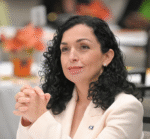Early parliamentary elections are being discussed as a potential way to break Kosovo’s institutional deadlock, but not everyone believes they would significantly alter the political landscape.
“All that can happen is a similar result and a return to the situation we are currently in. It is just an attempt to delay the solution,” Artan Muhaxhiri, a sociologist and political analyst, told Radio Free Europe.
Regular parliamentary elections in Kosovo were held on February 9. Dozens of attempts to constitute the Assembly have yielded no results.
Albulena Haxhiu from the Vetëvendosje Movement (LVV), which has struggled to secure the votes needed for its candidate to be elected as Speaker of the Assembly, floated the idea of holding extraordinary parliamentary elections alongside local elections later this year.
Albert Krasniqi from the non-governmental organization Democracy Plus (D+) suggests that elections might be the only way out if a compromise for constituting the Assembly cannot be reached. However, he does not anticipate major shifts in party representation in the Assembly. “In terms of numbers, there might be movement, which could strengthen or weaken political parties, but, naturally, there cannot be significant changes in such a short period,” Krasniqi stated.
While new elections are seen as a solution for Vetëvendosje – which came first in the February 9 elections but without enough votes to form a government alone – most of the opposition believes they would not fundamentally change the situation.
Abelard Tahiri, a Member of Parliament from the Democratic Party of Kosovo (PDK), argues that if new elections are held, they should not be combined with local ones. “…why should we wait for the local election deadline, which falls somewhere in mid-October? We should go much earlier,” Tahiri said.
For the Democratic League of Kosovo (LDK), new elections would resolve nothing. Lutfi Haziri, an MP and Deputy Chairman of the party, told Radio Free Europe that they would simply be a “repetition of the February 9 elections” in terms of the results.
“For the LDK, elections now are unacceptable. I don’t believe they solve anything, except perhaps improving the vocabulary of the first party [LVV], because in the [previous] electoral process there was a negative campaign, denigrating language – which has become a problem,” Haziri stated. He added that even if Vetëvendosje improves its rhetoric towards other parties, this is unlikely to change the LDK’s stance on cooperating with them. However, he did not rule out the possibility of future cooperation if circumstances, as he put it, become more favorable.
Bekë Berisha, an MP from the Alliance for the Future of Kosovo (AAK), also emphasized that the language used must change, stating that this is essential to overcome the political crisis pushing towards early elections. “[Elections] would not change anything [in party results]. But, the best thing would be if we understood – all political parties and political actors – that we must stop the animosity… We haven’t even left room to sit down, let alone talk,” Berisha concluded.







